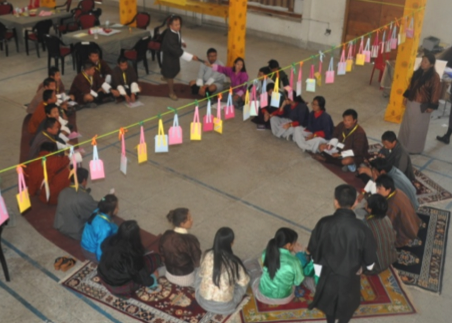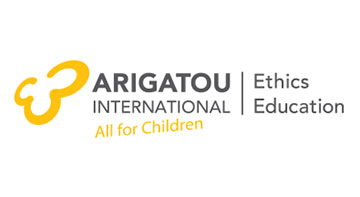Between 24 and 27 December 2014 a Teacher Training Workshop was held for teachers in Phuntsholing Higher Secondary School in the Phuntsholing district of Bhutan, organized by the Bhutan National Commission for UNESCO. 30 teachers from 20 districts attended the workshop. The workshop introduced the participants to the pedagogical concepts and principles of Global Citizenship Education. The program also helped teachers to develop knowledge and skills to prepare young learners for global challenges. During the workshop, participants reflected about ethics education and education for sustainable development. The workshop’s main aim was to train teachers on the pedagogical concepts and principles of Global Citizenship Education and build a deeper understanding and realization on the need for integrating and implementing the ideas of Global Citizenship Educaiton in the formal schooling system.
The workshop had multipl e sessions to try to help participants understand the concept of global citizenship and respect the views of people different from themselves; some of the sessions included were related to values, ethics, spirituality, cultural diversity and sustainable development.
e sessions to try to help participants understand the concept of global citizenship and respect the views of people different from themselves; some of the sessions included were related to values, ethics, spirituality, cultural diversity and sustainable development.
The final sessions of the workshop were related to the Learning to Live Together Programme of Arigatou International. The participants were taken on a Silent Journey which helped them explore their inner selves in relation to the environment. Participants were also encouraged to reflect about themselves in relation to others so that they could live in harmony with society. Activities were organized for participants to learn to build bridges of trust and work together with others.
The session on Ethics Education helped participants understand the universal values of nurturing peace and respecting cultural diversity. The Diminishing Islands activity of the Learning to Live Together manual was used by the facilitators to encourage participants to debate issues relating to respect, empathy, solidarity and reconciliation. Through reflections and interactive dialogue, participants also worked on the issues of rights and responsibilities and the importance of ethics education to make well-grounded ethical decisions that can help learning to live together with others.
The workshop ended with the participants coming up with an action plan through which they would teach Global Citizenship Education to their students, applying the methodologies and approaches learned in the workshop. Further at the end of each day the participants also took part of a Joyful Appreciation, based on the activity suggested in the Learning to Live Together manual, which helped them appreciate their interactions with others and the learnings and challenges of the day.
The participants were impressed by the workshop and many suggested that a similar workshop should be carried out in other parts of Bhutan. In the future the participants will be able to use the knowledge that they gained to teach their own students about Global issues and ethics and help Bhutan become a more peaceful and prosperous nation.
Special thanks to the Bhutan National Commission of UNESCO – Ministry of Education for organizing the workshop and for the facilitators who introduced the Learning to Live Together programme to teachers.
